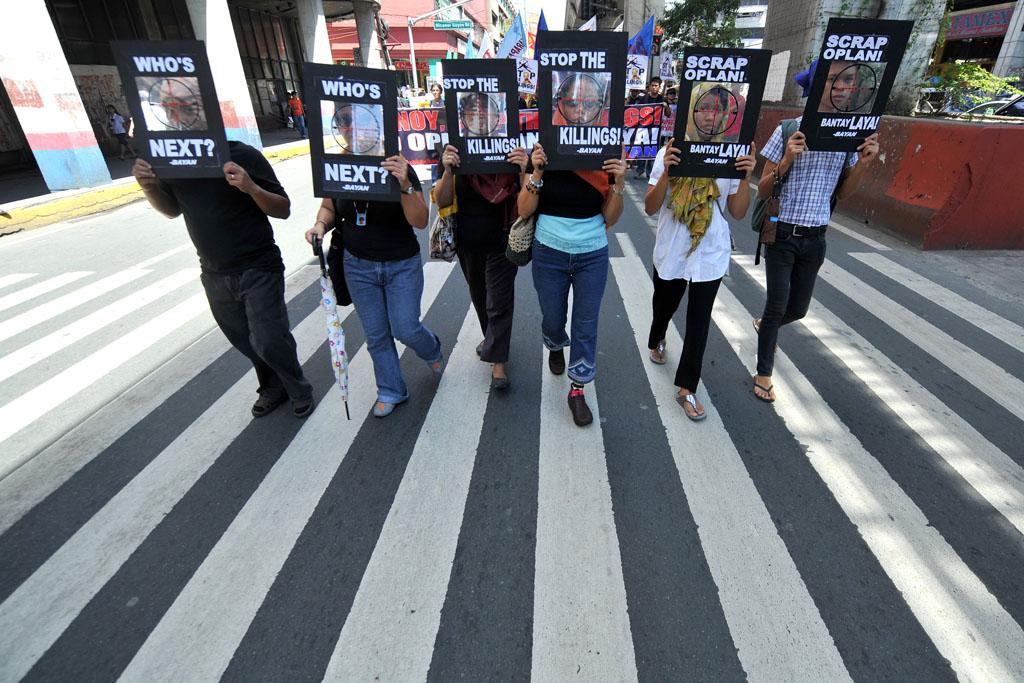Opinion: Philippines’ untouchable soldiers
Protesters march to Malacanang Palace as they demand the Aquino administration help end the extrajudicial killings of activists in Manila on July 19, 2010.
MANILA, Philippines — In a dimly lit house in the central Philippine island of Negros, Jaime, a little boy not yet 4 feet tall, described the horror when several soldiers killed a family friend before his eyes.
Early on the morning of Oct. 1, 2010, several soldiers broke down the family’s door, grabbed Rene “Toto” Quirante, and started beating him with their rifles. “He was trying to escape to the second floor, but they kept pulling him back and beating him,” Jaime (not his real name) told me. Jaime’s family begged the soldiers to let Quirante go. But one soldier shouted to another to hold him down and they shot him three times. “Then he was gone,” Jaime said.
Extrajudicial killings and impunity for members of the military — chronic problems at the heart of Jaime’s harrowing story — do not appear to have been on the agenda when U.S. Secretary of State Hillary Clinton met with Philippine Foreign Affairs Secretary Albert Del Rosario in June.
Nor has the United States raised these issues with President Benigno Aquino III in high-level bilateral discussions. And when the U.S. ambassador to the Philippines, Harry Thomas, Jr., opened joint U.S.-Philippines military exercises in Manila in April he missed an opportunity to raise concerns directly with a source of the abuses.
This brazen killing by soldiers has a familiar ring to it. Philippine military and police forces have been implicated in the killings and enforced disappearances of hundreds of leftist political activists, journalists and clergy during the past decade. Quirante was a local leader of a left-wing political party whom the security forces allegedly called a traitor. “I have never heard of him being involved in a criminal act,” a police investigator told me. “He just leads rallies.”
The Philippines faces multiple insurgencies from the communist New People’s Army and other armed groups that have been responsible for many serious abuses. The security forces have long blurred the lines between the peaceful political opposition and armed rebels, though. Often treating all as “enemies of the state,” to justify killing people who have never picked up a gun.
Last year, Filipinos elected as president the son of the late President Corazon Aquino and Ninoy Aquino, an opposition politician gunned down in an assassination linked to the Ferdinand Marcos regime. Before Benigno Aquino III took office on June 30, 2010, he pledged to address government killings and uphold justice. Yet over the past year, Human Rights Watch has documented at least seven killings and three “disappearances” in which the military is implicated.
Quirante’s killers wore uniforms and did not bother to cover their faces, despite the presence of a number of witnesses. The fact is that members of the military have rarely been held to account for serious abuses.
Police investigations stall when the evidence leads them to the military barracks. Aquino says that the killings are not government policy, but he has failed to take meaningful steps to stop them and to hold the killers to account. Things seem unlikely to change unless there is also external pressure — foreign pressure has proved effective in reducing the number of killings in the past.
The United States provides significant assistance to the Philippine military. Since 2008, the U.S. Congress has conditioned up to $3 million of military funding a year on the Philippine government making key improvements on investigating and prosecuting extrajudicial killings. However, rather than working to meet those standards, the Philippines has opted not to ask for these conditioned funds.
Ongoing extrajudicial killings and impunity have long been raised in U.S. State Department human rights reports. But the Obama administration should be sending a consistent message in public and private communications with the Philippine government that it will not continue to support a military responsible for gunning down activists and other serious human rights violations.
Unless Aquino’s government starts to hold soldiers who commit these abuses to account, the United States should increasingly withhold portions of military assistance and suspend joint military exercises. The failure to do so will only embolden Quirante’s killers and other abusers who believe that when they wear a uniform, they are untouchable.
Jessica Evans, an Asia researcher at Human Rights Watch, is the author of a new report about military involvement in extrajudicial killings in the Philippines.
Every day, reporters and producers at The World are hard at work bringing you human-centered news from across the globe. But we can’t do it without you. We need your support to ensure we can continue this work for another year.
Make a gift today, and you’ll help us unlock a matching gift of $67,000!
